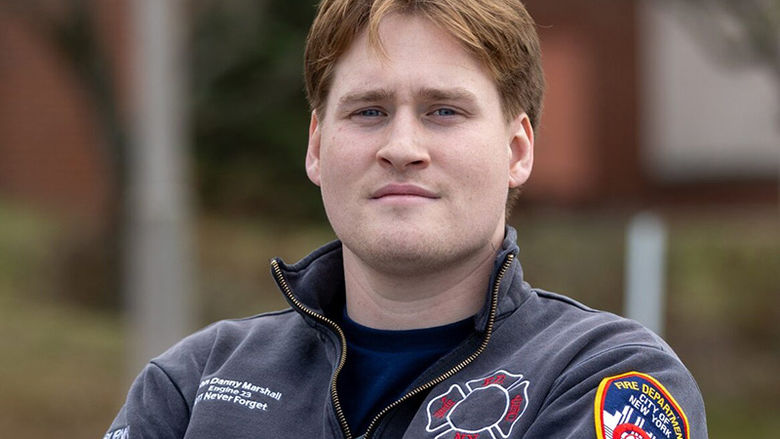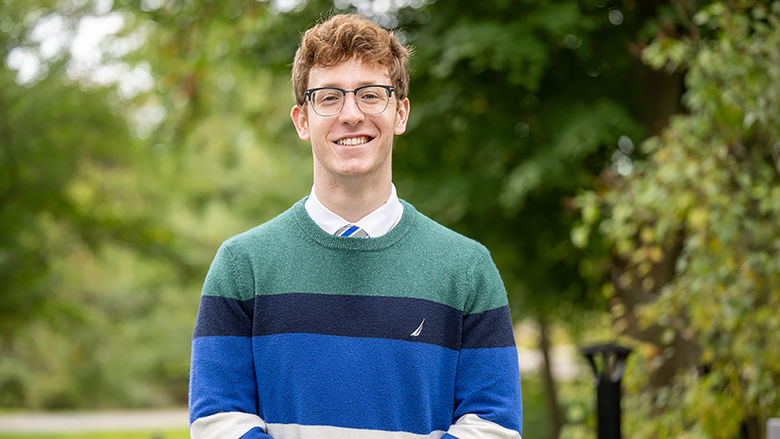

This dialog contains the full navigation menu for this site.

Penn State Erie, The Behrend College, awarded 651 undergraduate and graduate degrees at its spring commencement. The ceremony was held at Erie Insurance Arena.
“There’s nothing to be done at such a moment except to be thankful,” said new graduate Yuanheng (Arthur) Wang, who welcomed the graduates and their families. “Thankful for the people, places and ideas that we have connected, and that connected us back.”
Wang, a graduate of the Schreyer Honors College, earned a degree in English.
Commencement candidates were led onto the arena floor by student marshals – students who had the highest cumulative grade-point average in their school. Daphne Cruz Hidalgo, an electrical engineering major, represented the Schreyer Honors College. Ariana Gloeckner, a graduate with degrees in international business and accounting, represented the Black School of Business.
Joseph P. Helbling, a mechanical engineering major, represented the School of Engineering. Marjorie E. Schill, an arts administration major, led the School of Humanities and Social Sciences. Lindsey K. Chase, a biology major, represented the School of Science.
Melanie Hetzel-Riggin, an associate professor of psychology, gave the faculty address, which was titled “Just Breathe.” She coordinates the college’s newest graduate degree, the Master of Arts in applied clinical psychology.
“One thing you have probably already learned during your time in college is that life is full of complexity and confusion,” she said. “We often don’t know what is going to happen next, and most questions have a million possible answers. Learn to roll with whatever life throws at you, mindfully take it all in, and accept the challenges as they come.”
Priscilla Hamilton, a retired U.S. Army Colonel, gave the commencement address. Hamilton, a 1978 graduate of Penn State Behrend, is the former commander of DENCOM, the Army’s worldwide system of oral health-care clinics. Her address was titled “The Helping Hand.”
Paige Allen, a project and supply chain management major, gave the student farewell address. “We will use what we learned here to guide that open path in front of us,” she said. “It may lead us in different directions, but that’s what makes us who we are. If you stay true to yourself and never forget where you came from, your path will lead you in the right direction.”
Melanie Hetzel-Riggin, an associate professor of psychology, gave the faculty address at Penn State Behrend's spring commencement. Her comments are reprinted here in their entirety:
Thank you for that introduction. On behalf of the faculty and staff, I would like to extend my greetings to Chancellor Ford and members of the Penn State Behrend college administration, members of the Council of Fellows, distinguished and honored guests, alumni, and the family and friends who are helping us celebrate this commencement ceremony. It is an honor and a privilege to be giving the faculty commencement address.
My distant relative and the 10th president of Penn State, Ralph Dorn Hetzel, believed that land grant universities such as Penn State should meet the needs of all the state's citizens. He created the precursor to the Commonwealth Campus system during the Great Depression so every young adult in Pennsylvania would have an opportunity to attend college. To be standing here, speaking to those of you who have made his vision a reality—it is truly an overwhelming experience.
I want to congratulate all of you who are graduating today. Your hard work has led to this pinnacle of achievement—it means you graduate today with a Penn State degree. That is an amazing accomplishment, and you should all be incredibly proud.
Now that you have finished this chapter of your life, tomorrow you will start a new one. Now you will move forward into the great unknown, maybe beginning your career or furthering your education. More than ever, you will be responsible for your own lives and decisions. While those of us that have helped you on your path will be here if you need us, today you take that final step and fly without us there to catch you.
Panicking yet? Try taking a deep breath.
If you are panicking, you are not alone. We live in tumultuous times. For those of you graduating today, the reality is you will face unprecedented challenges. Young adults today work more and get paid less than their parents, and often still have to take on debt to pay for education and medical expenses. According to the Center for Collegiate Mental Health, 38 percent of students have experienced a traumatic event, while many more struggle with chronic stress due to the constant balance of work, education, and family stressors. Many of you will face discrimination, oppression, and microagressions. It is inevitable that your future will hold countless challenges and obstacles.
Let’s take another deep breath.
Given all of these challenges, it would be really easy to run away from it all—go hide your heads in the sand or your parents’ basements. But here is what I know. Your generation has a unique set of skills and abilities that will help you overcome all of these barriers. For example, you grew up with technology and social media—you are digital natives and know how to connect with others and leverage opportunities in ways I can barely understand. You are also committed to social justice and are comfortable in our emerging globalized world—you embrace differences and are open to learning from those dissimilar from yourself. Compared to the generations that came before, you are more innovative, collaborative, connected, resourceful and energetic—and from the students I have worked with who are sitting here today, I know that this is true of our graduating class. I have seen this cohort of students grow from wide-eyed, anxious freshmen to the competent men and women sitting before me. I have learned that you are a resilient group. It has been a blessing to watch you adapt and grow over your college careers – to see true resiliency in action.
As Dr. Kahl said in my introduction, I have spent my career studying resiliency. Decades of psychological research has shown us that there are many effective ways that we can successfully cope with whatever life throws at us. I thought I would take a few minutes to share some effective ways to handle the stressors your future holds. I know from my years as a teacher and therapist that having many tools in your toolbox is the best way to handle anything.
First: Just breathe. Breathing—slow, deep breathing—is one of the absolute best things we can do in response to stress. Taking the time to focus on and slow your breathing is your body’s natural way of initiating a relaxation response. It also helps us calm our mind and pause before acting. Deep breathing loosens tight muscles and slows your heart rate, and has been shown to improve chronic health conditions and your immune system functioning. Best of all, no one is going to think you are odd if you are in the middle of an important meeting and take a breath—everyone breathes.
Winston Churchill remarked that, “a pessimist sees the difficulty in every opportunity; an optimist sees the opportunity in every difficulty.” Optimism, or hopefulness and confidence about the future, can also be a very powerful coping tool. Psychological research has demonstrated that people who are optimistic are both physically and mentally healthier. They tend to be more resilient to stress and use more proactive coping strategies when faced with challenges. Optimism can even prevent and minimize chronic diseases. To practice optimism, you must believe that positive life events are more frequent and stable than negative life events. You must hold on to hope and the belief that everything will be okay. And I tend to agree with the 14th Dalai Lama XIV, who said, “Choose to be optimistic—it feels better.”
Seek out those around you for support. Social support is unusually important for your physical and mental health. Positive social support from friends and family can enhance your resiliency to stress, protect against diseases, and has even been linked to longer life spans. The Beatles had it right when they sang, “I get by with a little help from my friends”—humans are social creatures and we crave connection with those around us. One of the reasons humans have been so successful compared to other species is because we have an inherent need to develop social networks and to seek out others when we are threatened. That’s why I talk to my parents every weekend, and why you should too.
One of our greatest Presidents, Franklin D. Roosevelt, said, “The only thing we have to fear is fear itself.” I have to disagree with President Roosevelt, as we know from psychology that fear is nothing to be afraid of. Maybe it is my Midwestern roots, but I am more partial to the words of Mark Twain, who said, “Courage is the resistance to fear, mastery of fear – not absence of fear.” Fear is a survival mechanism – it tells us when we should be cautious and pay attention. Once we realize that fear is a clue and not something dangerous in itself, we can learn to embrace that fear and take risks. And I encourage you to do that—whether that is the new job, new relationship, new learning experience, or that bungee jumping excursion you had been considering. As I sing to my kids (albeit badly) when we watch "Zootopia," “Try Everything.”
Believe in yourself. Albert Bandura, a prominent psychologist and one of my professional heroes, has demonstrated in his research that when you believe that you can do something, you usually can. Self-efficacy, or your belief that you have the skills and abilities to meet your stressors head on, is an incredibly powerful tool that can provide you the confidence and motivation to carry on when things get difficult. To quote Mary Kay Ash, the founder of Mary Kay cosmetics, “If you think you can, you can. If you think you can’t, you're right.” But also remember the words of Eleanor Roosevelt: “No one can make you feel inferior without your consent.” Believe in yourself, and don’t let anyone take that away from you.
But sometimes we fail—and that is okay. Embrace failure. Hopefully by now you have learned that FAIL is an acronym—it means "first attempt in learning." Failure is the best way to learn and to grow. When you fail, and you will fail, don’t give up—figure out what went wrong and try something else. One of the best examples of this is Thomas Edison, the inventor of the light bulb and literally thousands of other things. When asked how he handled failure, he remarked, “I have not failed. I've just found 10,000 ways that won't work.” I fail daily, whether that is getting a late start in the morning, forgetting my keys, or locking myself out of my Penn State access account. But then I remember the words of President Obama: “Don’t let your failures define you—let them teach you.”
One thing you have probably already learned during your time in college is that life is full of complexity and confusion. We often don’t know what is going to happen next, and most questions have a million possible answers. Anyone who has taken an introduction to psychology course knows that the most likely answer you will get when you ask a psychology faculty a question is, “it depends”. This “delicious ambiguity,” as Gilda Radner put it, is something to embrace. Most of the time we are not going to know what the next best step is—and that is something to savor. Learn to roll with whatever life throws at you, mindfully take it all in, and accept the challenges as they come.
All of you sitting before me today have shown that you can handle the slings and arrows of outrageous fortune. You have accomplished so much, and I know that your futures will be full of amazing possibilities. When life seems overwhelming, just breathe. Take with you the words of Wilson Greatbatch, the inventor of the internal pacemaker and the grandfather of one of my students graduating today: “Don’t fear failure. Don’t crave success. The reward is not in the results, but rather in the doing.”
Congratulations, and may the force be with you!


